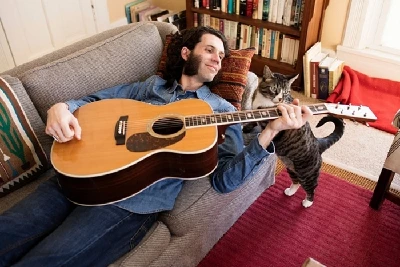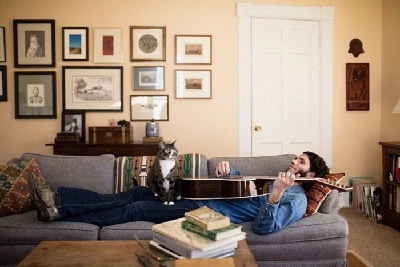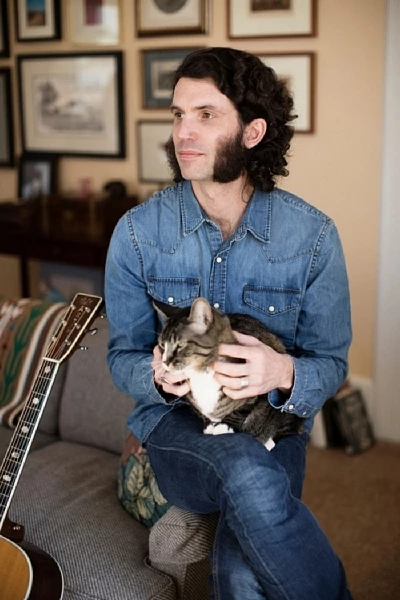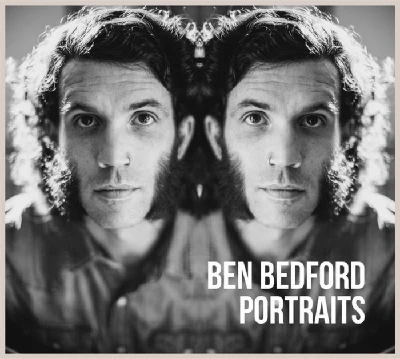published: 9 /
9 /
2020

Singer-songwriter Ben Bedford has recently revisited three albums of storytelling folk with a new compilation. He tells Ben Howarth about the process of choosing the songs and how his musical influences have shaped a gradual change of direction on more recent albums.
Article
I first encountered Ben Bedford when he toured the UK to promote his third album, ‘What Was Lost’, shortly after its release in 2012. I hadn’t heard of him before, and I actually chose to see him more on the strength of the venue (the excellent Green Note in Camden Town) than on the brief snippet of music I heard while browsing for upcoming shows. By this point, I felt able to trust the Green Note’s booking policy, safe in the knowledge that even if it wasn’t quite to my taste, the vegetarian food and drink would be enough for an enjoyable evening.
It turned out to be one of my very best whim purchases, as I was completely hooked by Bedford’s crisp baritone and historical storytelling. I left with copies of both his debut album, ‘Lincoln’s Man’ (2007) and the follow-up, ‘Land of the Shadows’ (2009). I would have bought the third as well, but had to make do with ordering it online later, as the copies he had brought to sell on tour were already sold-out.
I saw him again on his next tour, at Twickenham Folk Club, where he announced that he was planning something a bit different for his next album, branching out beyond traditional folk themes to reflect some of his musical interests, including his love of Kate Bush. His next two albums duly saw him stretch out his musical direction, without compromising the essential quality of his voice.
This year, however, sees Bedford revisit those first three albums on a new compilation, ‘Portraits’, which serves as both a primer for newcomers and a reminder for those of us who saw him on those earlier tours. Shortly before the release, we got in touch with Ben to ask him about those albums, his activities during lockdown and his plans for the future.
Pennyblackmusic: To begin, tell us about ‘Portraits’, the compilation you have just released of songs from your first three albums – what prompted you to revisit this part of your career and how did this release come about? How did you go about choosing which songs should be included?
Ben Bedford: Sure! Well, essentially, I really like these songs and I felt they deserved to have an official European release. None of my first three albums had an official release across the Atlantic. So, yeah, I thought they deserved one. Bert de Ruiter (Cavalier Recordings) and I talked about it and decided to make it happen. I definitely had some options, regarding selection. I obsess over sequencing. So, the flow was a major factor in selection. And, of course, strength of composition was a factor. And, yeah, I just like these songs and felt they deserved a showcase. And, for those people who have started following me only in the last three to four years, this will provide them with, I hope, an enjoyable introduction to my early career.
PB: The songs are all made up of original songs – but all in a ‘traditional’ style with songs rooted in American history. How were you introduced to this kind of songwriting and what were your main inspirations at the time?
BB: Yeah, maybe my first encounter with this kind of writing might have been Gordon Lightfoot's 'Canadian Railroad Trilogy', or his 'Wreck of the Edmund Fitzgerald'. Gordon Lightfoot's writing has definitely influenced my songwriting. I went from there to songwriters like Guy Clark and Townes Van Zandt. And from there to Richard Shindell and Patty Griffin. Many others, too, but I'd say that my early stuff is quite influenced by those five. Richard Shindell's songwriting might have been the catalyst for me to try to write some historical songs myself. I'm sure I was listening to songs like 'Arrowhead' and 'Reunion Hill' when I wrote 'Lincoln's Man'. And, of course, in addition to those five songwriters, I was influenced by lots of other stuff, too. I tend to go through listening phases.
PB: One of the most striking features of these songs is the confidence in your vocal performances – when did you start singing? Had you sung before taking up songwriting?
BB: Well, thank you! Yeah, I have been singing for as long as I can remember. Honestly, I still sing all the time. By that, I mean that I sing as I'm walking around the house and doing mundane sorts of things. Mostly, I make up little nonsense songs and sing them to my cat, Darwin. I started playing the guitar when I was fourteen but did not start writing my own songs until I was eighteen or nineteen. But, yes, I've been singing since I was small.
PB: Presenting these songs together on a compilation shows the similarities between these three albums – but were there any aspects of your approach to songwriting that changed between the first and third record?
BB: I sort of think of these three albums as siblings. 'Lincoln's Man' and 'Land of the Shadows' might even be fraternal twins, while 'What We Lost' is their slightly younger sister. But yeah, they flow together in a lot of ways. For one thing, I recorded all of them with my good friend, Chas Williams. He's the wizard playing all the second guitar parts and slide, banjo, etc. Peter Young plays drums on all three. Ron de la Vega plays bass on the first, and cello on the second and third. There is quite a bit of continuity in sound. 'What We Lost' is slightly more atmospheric, I'd say, than the first two, but all three albums live in a similar space in my brain. I think by the time I was recording 'What We Lost' in 2012, my approach to songwriting had maybe matured somewhat, but I think the approach itself was still pretty similar to what it had been.
PB: After ‘What We Lost’, your next two albums have moved away from storytelling folk to a more impressionistic style. Was there a conscious, deliberate decision to change your approach or was this more a reflection of a gradual change over time?
BB: I think it was just me evolving as an artist. I mean, when we went to record 'The Pilot and the Flying Machine', I knew it would be considerably different from my first three albums, but only because my tastes as an artist had shifted. So, organically, I was going to make different decisions based on those (I'd say) broadened tastes. But there was never a conscious decision to make things different just for the sake of being different. (Not that there is anything wrong with that.) My interests, musically, had shifted a bit, and the music simply reflects that. Similarly, when I recorded 'The Hermit's Spyglass', I knew it was considerably different too, and for basically the same reasons.
And I think the change was pretty gradual. My shifting tastes were, in large part, probably due to the fact that I was listening to more different kinds of music. I've always been into early music, as well classical music, especially Baroque stuff, but around 2012/2013 I started to listen to more jazz (heavy on Thelonious Monk but also Oscar Peterson, Kenny Burrell, Wes Montgomery and Miles Davis). I also started listening to more progressive rock (mostly stuff from the late 60s and early 70s like King Crimson, Bo Hansson, Gentle Giant, early Genesis, as well as solo Steve Hackett stuff). And I was listening to John Fahey, John Renbourn, Sandy Denny solo stuff, Punch Brothers, Kate Bush, Bruce Cockburn, George Winston, Phillip Aaberg, Liz Story, William Ackerman, Alex de Grassi, and on and on.
So, I'm sure all of that had an influence upon me, though I might not be able to articulate exactly where or how. As much as anything, new (to me) music inspires me. So, even if I don't intellectually understand everything I'm hearing from another artist, if I really like it, it inspires me to write. And then, I go do my thing and it sounds like me, even though it might have been inspired, in a roundabout way, by something that sounds totally different. (Actually, Punch Brothers, Cockburn, Renbourn and Fahey go back further than 2012 but I was probably listening with new ears.) (Besides the five songwriters I mention in the other question (Lightfoot, etc), all this doesn't even really cover the music that I listened to all the way up until I was about 29. So, obviously, I could go on and on about all the music that I love and that has influenced me in some way.)
Oh! Also in 2013, I got really into the albums that Richard and Linda Thompson did together, especially 'Shoot Out the Lights' and 'Pour Down Like Silver'. In fact, if I'm thinking critically about it, 'Shoot Out the LIghts' probably acted a bit like a musical bridge, for me, from the storytelling stuff to the more impressionistic. Or, maybe, it was a bridge of "permission to explore", if that makes sense. I really had an epiphany that I did not have to stay in any box! I did not have to colour inside the lines! There are no wrong notes! You know? I had already been a Richard Thompson fan for years, but for whatever reason, had overlooked those albums. A light bulb went off in my brain when I first heard them. Richard Thompson's guitar playing on those albums sounds so fearless to my ears. If there was any conscious decision that I made, it might have been that I decided I wanted to be a more fearless musician...whatever that means, exactly. Ha ha! I guess the rest followed. I hope it continues. Maybe I'm listening to something right now that will open up a new musical world. I expect I probably am. I'm relatively voracious when it comes to going down musical rabbit holes and exploring.
And I should mention that around this time(2012/13), I DID make a conscious decision to really hone my guitar playing. And I did really work at that diligently. I wanted to broaden my understanding of the instrument and become a better musician. That's an ongoing process, obviously. Or, I hope it is. I'm always trying to learn new things and broaden my knowledge and understanding. Connect the dots, so to speak.
PB: How have audiences reacted to the change – do you still play the folk material live or do you find it doesn’t fit as well with the newer material?
BB: Audiences have reacted favorably, I'd say. I do still play many of the songs that are on 'Portraits'. In fact, I'd say any of them could end up in a live concert. In the last couple years, my concerts have tended to be heavy on the material from 'Pilot' and 'Hermit', but I do still mix in earlier stuff. And especially now, since the release of 'Portraits', some of these songs will go into heavier rotation in set-lists.
Because the newer material is fairly different, I sometimes do a set of older stuff, and then, a set of newer stuff. But, I've come up with some creative ways to put it all together, and it flows. But, yeah, it is a concern. I see my concerts these days less as performances and more as little journeys. I want to go on a little journey and take the audience with me. Obviously, I don't want the material to cause that journey to feel herky-jerky. So, I am very conscious when it comes to the flow.
PB: Your most recent album was quite a change from what we hear on this compilation – with songs written about day-to-day life with your cat, interspersed with instrumentals. When did the ideas for that record start coming together and do you see yourself making more albums in this more conceptual style?
BB: I wrote all of the material for 'The Hermit's Spyglass' in January, February, and early March of 2018. I live in a little farmhouse on the edge of a prairie restoration area here in central Illinois, just west of Springfield. Simply put, I wanted to capture a bit of the magic of the place. The prairie is really quite lovely. At the time, I was reading a lot of Sigurd F. Olson and Helen Hoover. Both write beautifully about the Minnesota woods and the Boundary Waters between Minnesota and Ontario. In a way, I wanted to do something similar with 'Hermit'. I wanted to capture the place and convey it to listeners much as Hoover and Olson artfully illustrated Minnesota and Ontario for me. Interestingly, I found it easier to encapsulate the place, in some instances, with instrumental pieces rather than songs. I'd been messing around for years with little instrumental figures but I'd not gathered the courage to record any of them (where's my fearlessness, Richard Thompson?!). Here was an opportunity. For me, tunes like 'Quiet on the Green Hill' and 'Thunderstorm' convey what I'm trying to say better than any words I could conjure. And yeah! Darwin the Cat makes his world musical debut! Ha ha! He gets far more requests for autographs than I do.
As far as future albums, I think you will probably hear some similarities with 'Hermit' and 'Pilot'. In fact, I have a large pile of unrecorded material that I'm currently honing. It will be another conceptual project. And it will include songs and instrumental pieces. That seems to be where my brain is, these days. In a way, I simply follow what interests my brain. I do see through-lines in 'Hermit' that reach all the way back to the more story-centric songs of 'Lincoln's Man' and 'Land of the Shadows'. I think, even now with my instrumental pieces, I'm trying to tell little stories. As you say, the style is more impressionistic, but I think the stories are still there. There should be a trajectory or an arc that one can follow. I guess what I'm trying to say is that even when I'm writing an instrumental piece, I still feel like Ben the storyteller, on some level.
PB: During lockdown, with the break in touring and live performance, you’ve set up a patreon account and have been recording videos of song and performances at home through that platform. Have you learned anything new from doing this and do you think anything from this period will change your approach to performing or writing when things (hopefully) get back to normal?
BB: Yes! I have! The patreon thing has been fun! It's been a great incentive for me to finish a lot of half-finished stuff, record little videos, and then post them for my patrons. I'm sure I'm learning something, though I'm not sure specifically what. The pandemic has been a strange time. That's for sure. I don't think it has changed my writing approach, but, undoubtedly it will have an impact on my live concerts. I have not played live since the first week of March, so by the time I can actually tour again, I think I'll be extra enthusiastic. Under normal circumstances, playing live is a bit of an adrenaline rush. I think that will be heightened after not playing for sic to twelve months...or more. It's going to fun!
PB: Final question - At the point where you are able to record and tour again, do you have any particular plans, including any visit to the UK? Are you working on a new album?
BB: Yeah! We're putting together my 2021 schedule now and I have dates in the UK in September! All that material that I've been working on during the pandemic will, hopefully, coalesce into my next album. The working title is 'Quadrupeds'. Tentatively, I'd guess it'll probably be 2022 before it is released.
PB: Thank you.
Band Links:-
http://www.benbedford.com/
https://www.facebook.com/benbedfordmus
Play in YouTube:-
Have a Listen:-
Picture Gallery:-


